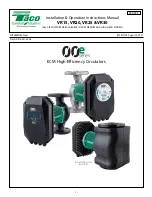
CLAGE
10
EN
4. Installation
Thoroughly rinse the water supply pipes before installation to remove soiling from the pipes.
1. Using a 12 mm hexagon socket screw key, screw the screw-in nipples according to image
manual into the wall connections as shown in. The seals must be fully screwed into the
thread.
Installing the wall bracket
• The electrical power supply cable may be connected in the upper part. In such case, the
connection will be done according to the description “Electrical connection from above” in
online manual.
• Install the appliance according to image manual.
Installing the appliance
Note: Accessories and surface mounting
Note: If necessary, the connecting terminal can be displaced to the upper part of the appliance.
To do this, please follow the instructions in the operating and installation manual available online.
Check that the power supply is switched off prior to electrical connection!
1. Remove the outer sheath of the connection cable from about 6 cm above the wall outlet (fig.
E2). With the smaller opening ahead, slide the water splash protection sleeve over the con-
necting cable so that the sleeve is flush with the wall. This prevents any leaking water from
coming into contact with the electrical leads. It must not become damaged! The protection
sleeve must be used!
2. Strip the cables and plug them in the connecting terminals according to the wiring diagram.
The appliance must be earthed.
3. Pull the protective sleeve over the connecting cables until the sleeve fits perfectly in the
recess of the intermediate panel. Adjust the water splash protection sleeve as illustrated and
fix it with the sleeve fixing (A). Reinsert the control panel and lock it on (fig. E3).
4. Place the hood on the appliance and screw in the fastening screw. After that you can slide
on the faceplate from the bottom up to the stop.
2. Hold the included mounting template according to image manual on the wall, mark the drill
holes according to the template and drill them using a 6 mm drill.
3. Pull down the faceplate and unscrew the main hood screw to open the appliance.
4. Loosen the knurled nut of the wall bracket, remove the wall bracket and screw it on the wall.
Offset tiling or uneven surfaces can be compensated by up to 30 mm with the aid of the
spacers supplied. The spacers are fitted between the wall and the wall bracket.
Only by a specialist!
Please observe:
• e.g. VDE 0100
• The installation must comply with current IEC and national local regulations or any particular
regulations, specified by the local electricity supply company
• The rating plate and technical specifications
• The appliance must be earthed!
5. Electrical connection
Wiring diagram
1. Electronic circuitry
2. Heating element
3. Safety pressure cut-out
4. Connecting terminal
5. Safety thermal cut-out
Electrical connection from below
(fig. E1)
Structural prerequisites
• The appliance must be installed via a permanent connection. Heater must be earthed!
• The electric wiring should not be injured. After mounting, the wiring must not be direct
accessible.
• An all-pole disconnecting device (e.g. via fuses) with a contact opening width of at least
3 mm per pole should be provided at the installation end.
• To protect the appliance, a fuse element with trigger characteristic C must be fitted with a
tripping current commensurate with the nominal current of the appliance.
Note: Load shedding and electrical connection from above
For further informations please use the online operation and installa-
tion instruction. Please follow the link below or use the QR code via
smartphone or tablet.
https://www.clage.de/links/gma/DBX-Next-GMA-9120-34380
For further informations please use the online operation and installa-
tion instruction. Please follow the link below or use the QR code via
smartphone or tablet.
https://www.clage.de/links/gma/DBX-Next-GMA-9120-34380
Based on the national constitution guidelines a general test certificate
concerning the evidence of applicability of noise behaviour is granted.
16951
• Put the water flow reducer “
D
” into the hot water connection piece. The O-ring must be
visible after insertion.
Note: Fasten the screw nuts with caution, to avoid damage to the valves or the piping system.
• As shown in the illustration, screw the cold water connection piece with the union nut and
the ½ inch seal onto the cold water connection.
• Screw the hot water connection piece with the union nut and the ½ inch seal onto the hot
water connection.
(fig. D2).
Installing connection pieces
The following regulations must be observed:
• e.g. VDE 0100
• EN 806
• Installation must comply with all statutory regulations, as well as
those of the local electricity and water supply companies.
• The rating plate and technical specifications
• Only intact and appropriate tools must be used
Installation site
• Appliance must only be installed in frost-free rooms. Never expose appliance to frost.
• The Appliance must be wall mounted and has to be installed with water connectors down-
ward or alternative transversely with water connections left.
• The appliance complies with protection type IP25 and may therefore be installed in protec-
tion zone 1 according to VDE 0100 part 701 (IEC 60364-7).
• In order to avoid thermal losses, the distance between the instantaneous water heater and
the tap connection should be as small as possible.
• The appliance must be accessible for maintenance work.
• Plastic pipes may only be used if they conform to DIN 16893, Series 2.
• The specific resistance of the water must be at least 1100 Ω cm at 15 °C. The specific resist-
ance can be asked for with your water distribution company.
1300
Summary of Contents for DBX 18 Next
Page 67: ......














































